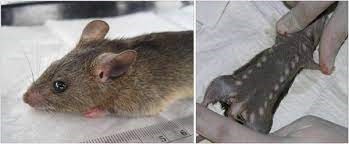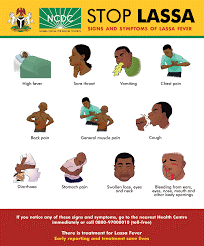Sensitization and Awareness Message on Lassa Fever
SENSITIZATION AND AWARENESS MESSAGE
FROM: THE UNIVERSITY HEALTH SERVICES, UNIVERSITY OF JOS
TO: ENTIRE UNIVERSITY OF JOS COMMUNITY

LASSA FEVER
WHAT IS LASSA FEVER?
Lassa fever is a fatal, zoonotic (animal borne) disease, caused by the Lassa virus. It affects many organs and systems of the human body. The virus is transmitted by the multimammate (has many breasts) rats known as Mastomys natalensis. The rats do not have symptoms of the disease, but actively spread the virus through their feaces, urine, saliva or blood.
Lassa fever is common in many West African countries, including Nigeria, and occurs all year round, but even more so during the dry season. As at January 2024, cases have been reported, so far, in Ondo, Edo, Bauchi, Taraba, Ebonyi, Anambra, Benue, Gombe, Kaduna and Kogi states.
HOW DOES LASSA FEVER SPREAD?
The disease can be spread through any of the following ways:
· Direct contact with saliva, urine, feaces or blood of infected rats.
· Eating food or drinking water that has been contaminated by saliva, urine, feaces or blood of infected rats.
· Touching of household objects that have been contaminated by saliva, urine, feaces or blood of infected persons or rats.
· Inhaling air that contains small particles of saliva, urine, feaces or blood of infected rats while sweeping or cleaning.
· Person-to-person through contact with the saliva, throat secretions, blood, urine or semen of an infected person.
WHO CAN BE INFECTED?
Lassa fever can affect individuals of all age groups and gender, who come in contact with the saliva, blood, urine or feaces of infected persons or rats. These include:
· People living in dirty environments.
· People who practice poor food storage techniques, including drying of food in open spaces.
· People who hunt rodents.
· People who practice bush burning.
· Family members who are taking care of individuals infected with Lassa fever.
· Doctors, nurses and other health workers who provide direct care to patients of Lassa fever.
· Hospital staff who clean/disinfect contaminated surfaces.
· Laboratory staff who handle blood and other samples from suspected Lassa fever cases.
SYMPTOMS AND SIGNS OF LASSA FEVER
These appear 6 to 21 days after coming in contact with the Lassa fever virus. Symptoms may be difficult to differentiate from other febrile illnesses such as malaria, typhoid fever, viral hepatitis and measles, among others.
· Fever (temperature of ≥38⁰C which persists after 2 days of antimalarial or antibiotics)
· Headache
· Sore throat
· Cough
· Vomiting
· Abdominal pain
· Diarrhoea
· Chest pain
· General body pain
· Back pain
· Restlessness
· Swelling of the face, eyes and neck
· Redness of the eyes
· Bleeding from body openings (nose, mouth, ears, eyes, etc)
WHAT ARE SOME COMPLICATIONS OF LASSA FEVER?
These include:
· Deafness
· Seizures
· Low blood pressure
· Spontaneous miscarriage
· Infection/inflammation of the brain (encephalitis)
· Fluid in the lungs (pleural effusion)
TREATMENT OF LASSA FEVER
Lassa fever can be treated if detected early. There is no preventive vaccine for now. If symptoms are suspected, contact the nearest health facility immediately.
HOW TO PREVENT INFECTION BY LASSA VIRUS
· Properly educate and sensitize individuals and communities.
· Maintain personal and environmental hygiene.
· Regular control of rats/rodents.
· Avoid touching live or dead rats with bare hands.
· Cover all food and water in rodent-proof containers. Do not spread or dry food by the road side or other open areas where rats can gain access.
· Properly dispose of food exposed to or partly eaten by rats/rodents.
· Dispose of all waste properly in covered waste bins.
· Regular use of PPEs (hand gloves, face masks, gowns, etc) when caring for patients diagnosed with, or suspected of having, Lassa fever.
· Maintain a high index of suspicion in all patients who have fever in areas where Lassa fever occurs commonly.
· Isolation of suspected cases.
· Thoroughly clean and disinfect hospital surfaces and environment.
Early detection saves lives.
Dr Mairiga Benedict B. (KSM)
(MBBS,FMCGP, MIPH,CSE,CPA, MCAI, JP),Director, University Health Services
Dr Salaam Adama A. (MBBS, FMCFM)
CMAC, University Health Services
- Log in to post comments





